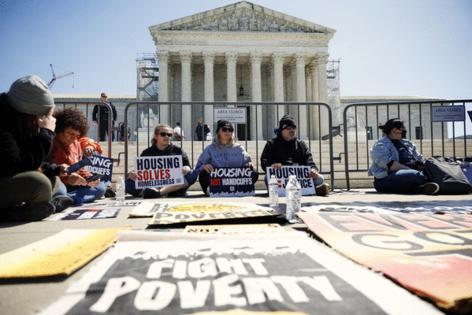Supreme Court airs concerns over Oregon city's homelessness law
Published in News & Features
WASHINGTON — The Supreme Court appeared hesitant Monday to draw sharp lines about when local governments that criminalize public camping infringe on the constitutional rights of people experiencing homelessness.
Across more than two hours of oral arguments, a majority of the conservative-controlled court repeatedly asked the parties about how they could decide a challenge to a law in Grants Pass, Ore., in a way that avoids involving the courts in policy disputes about addressing homelessness.
The case reflects how cities and counties across the country have grappled with problems stemming from homeless encampments. The justices are set to decide the case by the conclusion of the term at the end of June.
The Grants Pass law prohibits anyone from sleeping or camping on public property “for the purpose of maintaining a temporary place to live,” with first civil citations and possible jail time for multiple violations.
In a class action lawsuit on behalf of homeless residents of the city, the U.S. Court of Appeals for the 9th Circuit threw out the statute on the grounds that it unconstitutionally punished homeless people when they had nowhere else to go.
The appeals court found that law violated the Eighth Amendment’s prohibition on “cruel and unusual punishment.” Enforcement of the law has been paused as the court challenge plays out.
Chief Justice John G. Roberts Jr. pointed out that having judges draw the line about when an arrest violates the Constitution would put them in the middle of what is essentially a policy debate on how to handle homelessness.
“It’s a policy problem because the solution, of course, is to build shelters, to provide shelter for those who are otherwise harmless. But municipalities have competing priorities,” Roberts said.
Roberts brought up that municipalities may have needs to address lead pipes or fire protection but feel forced to address homelessness first because of a Supreme Court decision.
“Why would you think these nine people are the best people to judge and weigh those policy judgments?” Roberts said.
...continued
©2024 CQ-Roll Call, Inc. Visit at rollcall.com. Distributed by Tribune Content Agency, LLC.







Comments